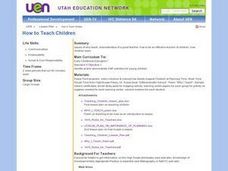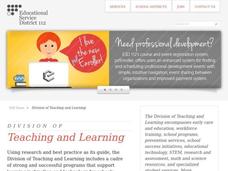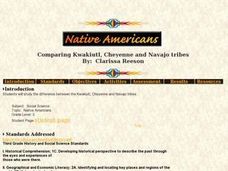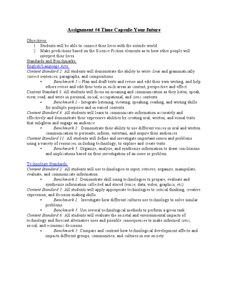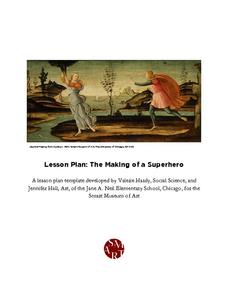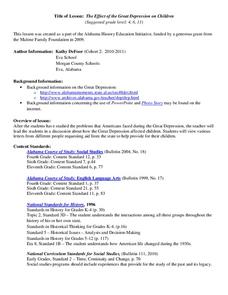Curated OER
Social Studies: War and the Media
Students examine the impact of the media on various wars, especially the Iraq and Vietnam wars. By examining cartoons and popular music as primary sources, they suggest motivations for the conflicts and propose reasons for public...
Curated OER
Social Studies: How to Teach Children
Students examine reasons for teaching children and the characteristics of an effective teacher. After a Powerpoint presentation which includes a humorous look at the 1915 rules for teachers, they create daily teaching schedules and...
Curated OER
Art or Artifact?
Young scholars analyze and discuss illustrations of the New World by John White. They examine the images, answer questions about each one, and write an essay.
Curated OER
The Great Depression and the Arts
Students engage in a dialogue about the Depression, the impact of the New
Deal, the role of Franklin Delano Roosevelt, the survival of Democracy, and the
resiliency of the American spirit.
Curated OER
Social Studies: Elections and Public Policy
Students explore the methods employed by political parties to influence voters. By creating presentations, they illustrate how voters can critically interpret that information. Students compare and contrast the influence of various...
Curated OER
African Art and Personal Adornment
Students explore the concept of personal adornment. They view and compile a list examples and compare personal adornment in American culture to that in African culture.
Curated OER
Social Studies: Debating Aid to Micronesia
Students simulate a debate about continued U.S. aid to the Federated States of Micronesia. In two large groups, they research the history of Micronesia and how it was affected by colonization and trusteeship. After the debate, students...
Curated OER
Social Studies: Public Sector Spending
Students watch a Powerpoint presentation on public spending. After a discussion, they compose a written comparison of the public sector spending plans of the three major British political parties.
Curated OER
Comparing Kwakiutl, Cheyenne and Navajo tribes
Third graders study the difference between the Kwakiutl, Cheyenne and Navajo tribes. They identify the people, resources, lifestyle and beliefs of the Kwakiutl, Cheyenne, and Navajo Indians. Afterward, they present their projects on each...
Curated OER
Gasoline Use Around the World
Learners contribute their own personal gasoline consumption data with other schools. They share thoughts and opinions on fossil fuels, its effects and what they can do in an effort to conserve natural resources.
Curated OER
Understanding "The Stans"
Young scholars explore and locate "The Stans" in Central Asia to create, write and illustrate maps, graphs and charts to organize geographic information. They analyze the historical and physical characteristics of Central Asia via...
Museum of Tolerance
Disenfranchised People of the New Nation
Why are some immigrant groups in the United States embraced while others become disenfranchised? To answer this question, teams investigate why groups emigrated to the US, why some of these these peoples were...
Curated OER
Credible Sources on the Internet: What to Trust, What to Dismiss and When to Cite a Source
Wait, you mean researchers don't all use Wikipedia? Teach your class about intelligent research with a lesson plan about evaluating digital sources. The lesson plan starts with a quickwrite and includes vocabulary exercises and...
Curated OER
Understanding Growth of the Phoenix Area
Young scholars study the growth of the Phoenix area using geographic images, maps, tables, and graphs. They study the idea of community.
Curated OER
Create Your Own Business!
Create a business and assess the costs of acquiring a business licenses and advertising. The class determines the name, location, business product to be sold and the best method to sell that product. A great way to understand the US...
Curated OER
Assignment #4 Time Capsule-Your Future
Class members create a PowerPoint presentation showing artifacts they would include in a time capsule. The artifacts and explanations reflect personal hobbies, grooming choices, school life, etc. A great way for class members to...
Curated OER
Now That's Beautiful!
Your class experiences dozens of messages about beauty every day by reading magazines, watching movies, and listening to the radio. Have them analyze society's view of beauty in groups after discussing several resources, including...
Curated OER
Barnyard Protest: Cows, Chickens & Fundamental Freedoms
Here is an ambitious and engaging instructional activity that should help elementary schoolers begin to develop a basic understanding of human rights. Pupils are asked to think about their own rights, the rights of others, and how an...
Smart Museum of Art
The Making of a Superhero
Thor, Loki, Iron Man, and Captain America. As part of their study of Greek and Roman gods and heroes, middle schoolers compare the characters in The Avengers to Greek counterparts. Individuals then create their own superhero,...
Classroom Law Project
What do cartoonists see in this election?
Cartoons from the 2008 Presidential election provide the text for a instructional activity designed to help learners understand how political cartoonists use persuasive techniques to present a point of view.
Curated OER
Is Everyone Protected by the Bill of Rights?
Who is protected by the Bill of Rights? Learners examine the Bill of Rights and conduct research regarding gay people in the military. They use their research findings to prepare for and participate in a debate regarding the military ban...
Curated OER
History Did Happen in My Back Yard!
Eighth graders interpret historical evidence presented in primary resources. In this Louisiana history lesson, 8th graders research their parish history using the LOUISiana Digital Library resources. Students create multimedia...
Alabama Department of Archives and History
The Effect of the Great Depression on Children
How did the Great Depression affect children? Sometimes studying the Great Depression means only studying about how it affected adults, however, relating the experiences of children and peers their age to themselves may make the...
Curated OER
How Does a Friend Act?
Students brainstorm a list of characteristics that friends should and should not have. In groups, they are given a set of hand puppets in which they role-play different scenerios in front of the class. To end the instructional activity,...

